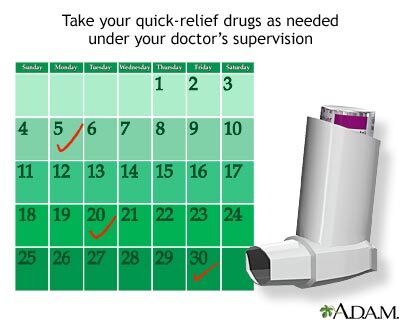Asthma - quick-relief drugs
Description
Asthma quick-relief medicines work fast to control asthma symptoms. You take them when you are coughing, wheezing, having trouble breathing, or having an asthma attack. They are also called rescue drugs.
Many of these medicines are called "bronchodilators" because they open (dilate) and help relax the muscles of your airways (bronchi).
You and your health care provider can make a plan for the quick-relief drugs that work for you. This plan will include when you should take them and how much you should take.
Plan ahead. Make sure you do not run out. Bring enough medicine with you when you travel.
Patient Education Video: Inhaler with no spacer - adults
Alternative Names
Asthma - quick-relief drugs - short-acting beta-agonists; Asthma - quick-relief drugs - bronchodilators; Asthma - quick-relief drugs - oral steroids; Asthma - rescue drugs; Bronchial asthma - quick relief; Reactive airway disease - quick relief; Exercise-induced asthma - quick relief
Short-acting Beta-agonists
Short-acting beta-agonists are the most common quick-relief drugs for treating asthma attacks and are considered to be bronchodilators.
They can be used just before exercising to help prevent asthma symptoms caused by exercise. They work by relaxing the muscles of your airways, and this lets you breathe better during an attack.
Tell your provider if you are using quick-relief medicines twice a week or more to control your asthma symptoms. Your asthma may not be under control, and your provider may need to change your dose of daily control drugs.
Some quick-relief asthma medicines include:
- Albuterol (ProAir HFA, Proventil HFA, Ventolin HFA)
- Levalbuterol (Xopenex HFA)
- Metaproterenol
- Terbutaline
Short-acting beta-agonists may cause these side effects:
- Anxiety.
- Fast and irregular heartbeats. Call your provider right away if you have this side effect.
- Headache.
- Restlessness.
- Tremor (your hand or another part of your body may shake).
Patient Education Video: Inhaler with spacer - adults
Oral Steroids
Your provider might prescribe oral steroids when you have an asthma attack that is not going away. These are medicines that you take by mouth as pills, capsules, or liquids.
Oral steroids are not quick-relief medicines but are often given for 7 to 14 days when your symptoms flare-up.
Oral steroids include:
- Methylprednisolone
- Prednisone
- Prednisolone
Gallery



References
Marcdante KJ, Kliegman RM, Schuh AM. Asthma. In: Marcdante KJ, Kliegman RM, Schuch AM, eds. Nelson Essentials of Pediatrics. 9th ed. Philadelphia, PA: Elsevier; 2023:chap 78.
National Heart, Lung and Blood Institute. Asthma Management Guidelines: Focused Updates 2020. www.nhlbi.nih.gov/health-topics/asthma-management-guidelines-2020-updates. Updated February 4, 2021. Accessed April 22, 2022.
Papi A, Brightling C, Pedersen SE, Reddel HK. Asthma. Lancet. 2018;391(10122):783-800. PMID: 29273246 pubmed.ncbi.nlm.nih.gov/29273246/.
Vishwanathan RK, Busse WW. Management of asthma in adolescents and adults. In: Burks AW, Holgate ST, O'Hehir RE, et al, eds. Middleton's Allergy: Principles and Practice. 9th ed. Philadelphia, PA: Elsevier; 2020:chap 52.